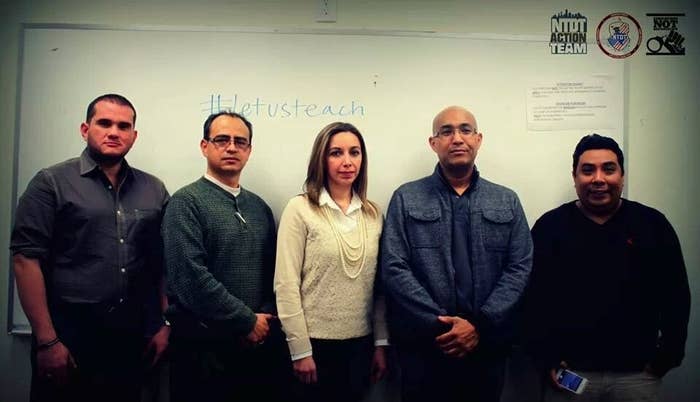
Larry Glick, the school board president in Garland, Texas, could not hold back tears Tuesday night.
He was presiding over a routine board meeting when he was confronted by a group of students, parents, and activists. One after another, they spoke on the merits of immigrant teachers. They had come to offer support for two dozen educators who may be forced to leave the United States.
"My mother came through Ellis Island in 1928," Glick told BuzzFeed. "So the testimony moved me."
The Department of Homeland Security recently rejected the Green Card applications of 23 foreign teachers at the Garland Independent School District (GISD). The teachers, many of whom have been in the United States for over a decade, have asked the district to intervene in their favor. The district has no legal authority to grant them permanent residency, but told BuzzFeed it will do everything in its power to help them stay.
Yet the relationship between the teachers and the district is not without tension. Some of the teachers claim the district is partly responsible for their rejected applications.
"We followed all the rules," said Alfonso Casares, one of the teachers whose application was rejected. "The district and their lawyers were the ones who made mistakes, but we are paying the consequences."
Casares and his wife Maria told BuzzFeed that Yu, South and Associates, the law firm hired by the district to process their applications, failed to submit documents on time on several occasions. The couple also said they had been asked to pay the government fees and attorney honoraries involved in their application — a practice which goes against Department of Labor regulations.
"Ever since we arrived in Texas, we've had to pay for visa renewals and for the residency application," Maria said. "We have had to pay over $20,000. "
A spokesperson for Yu, South, and Associates declined to comment. The district confirmed that it had worked with the law firm in the past but that it has since ended its relationship with the attorneys. Chris Moor, the district's director of communications, added that the GISD has launched an inquiry into "inconsistencies" and "irregularities" in the teachers' application process, but declined to give more details because the investigation is ongoing.
The case of the Garland 23 highlights the often arduous and taxing complexity of the process of applying for permanent residency, where a single typo can be enough to derail a person's chances of staying in the United States. The teachers came to Garland on H1B visas, a type of work visa offered to foreign professionals who have secured employment in the United States.
The H1B is a non-immigrant visa, which means that it does not come with a promise of eventually leading to permanent residency. That said, employers can choose to sponsor their H1B employees when they apply for a Green Card. The GISD has in the past successfully sponsored some, but not all, of its 230 foreign teachers.
The teachers have the support of the North Texas Dream Team (NTDT), an immigrants' rights advocacy organization. Members of the NTDT told BuzzFeed that the case of the Garland teachers highlights another side of the immigration debate, which often focuses on students but also affects teachers.
Ramiro Luna, an organizer with NTDT, said the group was planning to take the teachers' case to members of Congress as an example of the need for immigration reform. He said that they had tried to reach out to Congressman Pete Sessions, a Republican, to ask for his help.
"He has said they support the DREAM act students," Luna said. "Now we want to see if he is willing to support the teachers who teach these students."
Glick agreed on the need for political action, which for him has roots in personal experience.
"These are good teachers," said Glick. "We recognize the need to do everything in our power to help them. We are reaching on a political level through private sources."
Barring something extraordinary, the teachers will have to leave the U.S. before the end of the year. If they chose not to they would likely be deported. Some of them told BuzzFeed that the prospect of going back disheartens them.
"I came here from Colombia 10 years ago," said Bernando Montes. "I've given a decade of hard work to this country, and if I had to go back, I would face many difficulties. There are no jobs back home."
